Index relies entirely on the support of donors and readers to do its work.
Help us keep amplifying censored voices today.
[vc_row][vc_column][vc_column_text]The call by four Arab states — UAE, Bahrain, Saudi Arabia and Egypt — for Qatar to close news network Al Jazeera is clearly motivated by a desire to control the media in the region and silence reporting of stories that these governments would rather not see exposed.
Al Jazeera has brought the world news from the Arab Spring and many of the recent important moments from the region. Including the closure of Al Jazeera in a list of demands that Qatar “should” comply with to end a diplomatic crisis is about reducing media freedom in a region where it is already threatened.
“From its treatment of blogger Raif Badawi to its tightly controlled media environment, the Saudi authorities must not be able to dictate access to information for the public in other countries. Al Jazeera and press freedom must not be used as a bargaining chip,” Rachael Jolley, editor of Index on Censorship said.
None of the nations involved have a free independent media. Bahrain regularly targets critics, journalists and the one remaining opposition newspaper in the country, Al Wasat. Saudi Arabia sentenced blogger Raif Badawi to 10 years in jail and 1,000 lashes for his “criminal” writings. Egypt has regularly tried journalists on accusations of terrorism. The UAE, too, curtails discussion of its domestic policies. UAE Federal Law No. 15 of 1980 for Printed Matter and Publications regulates all aspects of the media and is considered one of the most restrictive press laws in the Arab world, according to Freedom House. Reporters Without Borders ranks them all below 118, with Saudi Arabia, Egypt and Bahrain all below 160 out of the 180 nations it covers.[/vc_column_text][/vc_column][/vc_row][vc_row][vc_column][vc_basic_grid post_type=”post” max_items=”12″ style=”load-more” items_per_page=”4″ element_width=”6″ grid_id=”vc_gid:1498231474147-ef0d779a-68d3-0″ taxonomies=”9044″][/vc_column][/vc_row]
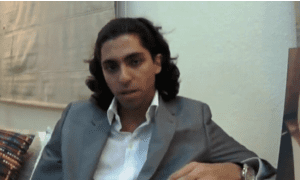
Saudi blogger Raif Badawi has been imprisoned for five years and flogged for exercising his fundamental right to free expression.
Join Index and others to mark the fifth anniversary of the arrest of Raif Badawi, a Saudi Arabian blogger and writer.
Badawi was arrested and detained in June 2012. In May 2014, Badawi was sentenced to ten years in prison, 1000 lashes, a huge fine, and two additional penalties – a ten-year travel ban and a ten-year ban from participating in visual, electronic and written media, both to be applied following his release.
Join a vigil at the Saudi Embassy
9-10am, Friday 16 June
To mark the five-year anniversary of Raif Badawi’s arrest and the birthday of his lawyer Waleed Abu Al-Khair, who himself is currently serving a 15-year prison sentence, join a vigil at the Saudi Embassy in London to continue to call for their immediate release.
Representatives of English Pen, Bread and Roses TV, Council of Ex-Muslims of Britain, Index on Censorship, One Law For All, the Peter Tatchell Foundation and Reporters Without Borders will be present.
Participants are asked to meet at the Curzon Street entrance to the Embassy. (note: the postal address of the Embassy is 30-32 Charles Street, Mayfair, London).
Spread the word
Please keep sharing details of Raif Badawi’s case and calls for his release on social media. Follow @Raif_Badawi on Twitter and tweet your support with the hashtag #FreeRaif
[vc_row][vc_column][vc_column_text]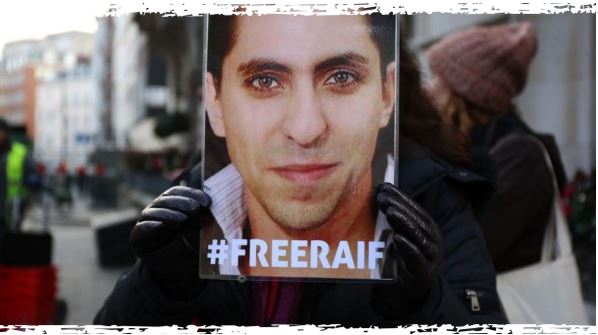
On 17 May 2017, Index on Censorship joined English Pen, Amnesty International and others in a protest of solidarity outside of the Saudi embassy in London to call for the release of blogger Raif Badawi.
Badawi was detained on 17 June 2012 for creating the website Free Saudi Liberals and “insulting Islam through electronic channels”. Following his arrest, he was eventually sentenced to 10 years in prison and 1000 lashes, the first 50 of which he received in public in January of 2015.
One month away from the five-year anniversary of his arrest, Badawi’s wife, Ensaf Haidar, led dozens of protesters at the embassy. Haidar has said her husband’s mental health is worsening. This makes her pleas with world leaders to aid in the release of Badawi even more urgent. She has recently directly petitioned, among others, the governments of the UK, Germany and her new home of Canada.
.@miss9afi, wife of @raif_badawi, leads vigil at @SaudiEmbassyUK to #FreeRaif pic.twitter.com/BmmYerDe1g
— Index on Censorship (@IndexCensorship) May 17, 2017
Many activists have been protesting at the gates of the embassy for a long time to show their support. Cat Lucas of English Pen said: “We’ve been coming here for almost two and a half years on account of Raif.”
Similarly, human rights campaigner Peter Tatchell said: “We’re here once again to support the campaign to release Raif Badawi and we won’t go away until he is free. Saudi Arabia has a duty to honour their commitments to the human rights law, as their crackdown is doing huge harm worldwide.”
Jo Glanville, director of English Pen, urged the British government to put pressure on Saudi Arabia for the release of Badawi: ,“We are approaching five years since Raif was arrested for doing no more than exercising freedom of expression. We call on the Saudi government to release him immediately and also on the British government to use its very close relationship with the kingdom to ensure he receives the justice he deserves.”
Badawi’s situation is not unique, as Imad Iddine Habib of the Council of Ex-Muslims of Britain CEMB noted: “We’re here to call for the immediate release of Raif Badawi who is unjustly in jail for expressing nothing more than his ideas and beliefs. He represents thousands of others who are in prison for similar reasons.”
A huge thank you to everyone who joined today’s #FreeRaif vigil. Your support means a great deal – to us & to his wife Ensaf Haidar. pic.twitter.com/j3Zle10bry
— English PEN (@englishpen) May 17, 2017
[/vc_column_text][/vc_column][/vc_row][vc_row][vc_column][vc_basic_grid post_type=”post” max_items=”4″ element_width=”6″ grid_id=”vc_gid:1495116120013-0a48b8dc-fc5e-5″ taxonomies=”7141, 1126, 5711″][/vc_column][/vc_row]
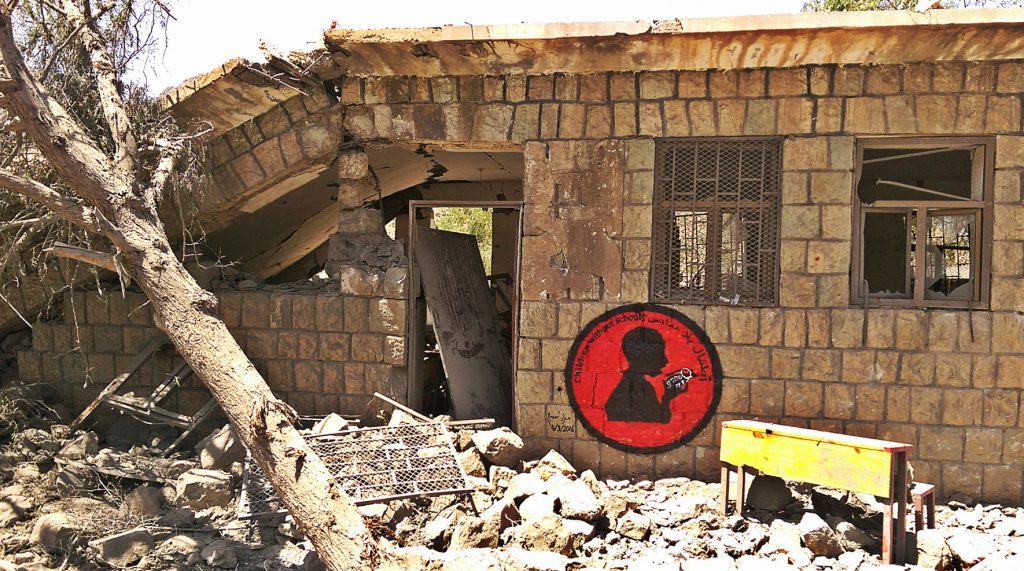
Credit: Ruins campaign. Bani Waleed, September 2016
On 3 September 2016, a group of Houthi rebels convened a meeting at al-Najah School in the al-Haima district of Bani Waleed, a local witness told Murad Subay, street artist and winner of the 2016 Index on Censorship award for arts, that the men entered the school without permission.
“We are not with any of the warring parties – we are caught in the middle,” the witness said.
Soon after, the school was destroyed in an airstrike carried out by the Saudi Arabian-led military coalition, killing one disabled student and adding 1,200 to the more than 3.4 million already forced out of education in the country as over 3,600 schools have been forced to close in the course of the war.
“Can you imagine? These are the soldiers of the wars to come,” Subay told Index. “Without education, these children could become tomorrow’s fighters and tools in the hands of extremists.”
At dawn on 4 September Subay travelled to Bani Waleed to create a mural on what remained of al-Najah.
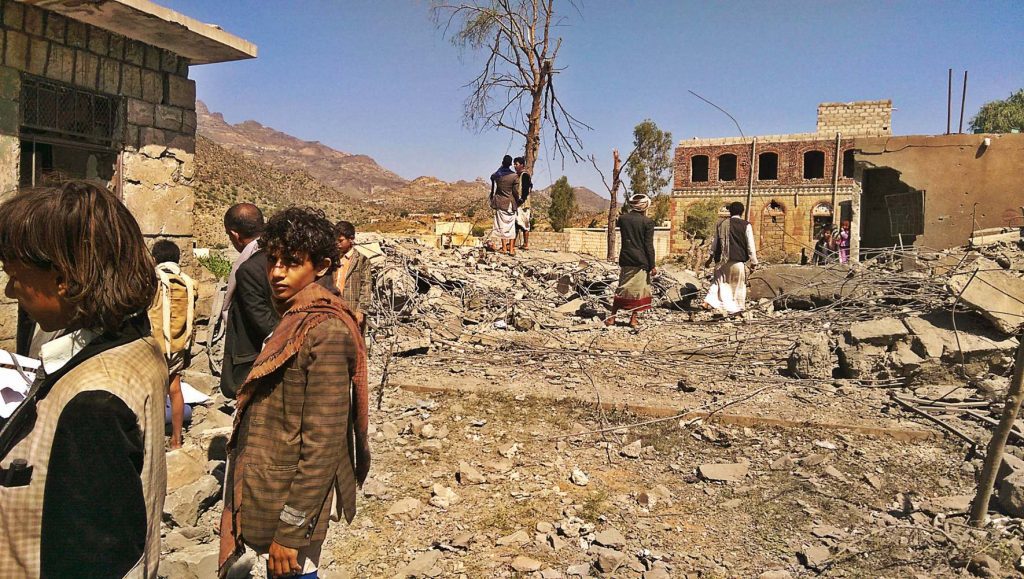
Credit: Ruins campaign. Bani Waleed, September 2016
“When we got there I asked some of the students what they were going to do now that their school was destroyed and some told me they will go to Sanaa while others said they will travel to surrounding villages,” Subay said. “But it will be much more difficult for the 400 girls who attended the school because traditions in Yemen mean they will not be able to travel alone, making it impossible for them to go to other villages to study.”
2016 Freedom of Expression Fellow Murad SubayMurad Subay is the 2016 Index on Censorship Freedom of Expression Arts Award-winner and fellow. His practice involves Yemenis in creating murals that protest the country’s civil war. Read more about Subay’s work. |
Destroying schools isn’t a big deal for the warring parties, the artist added. “Some of the children of those leaders who shout ‘death to America’ are studying at the best universities in the world, including in the USA, while each bombed school in Yemen – especially big ones like al-Haima – will take years to rebuild.”
The situation is made even more difficult in a time of war when resources and building materials are almost impossible to come by. “Even if the West stopped supplying weapons to Saudi Arabia today and patted themselves on the back saying ‘we are doing good’, Saudi Arabia already has enough to wage wars for another 150 years if it wants.”
If there is any hope for peace to prevail and schools, hospitals and other buildings belonging to the people are to be rebuilt, countries like Britain and America should take a step further and tell Saudi Arabia “to show restraint”, Subay said.
“While Saudi Arabia is doing the majority of the destruction, all sides of the war in Yemen must take responsibility.”
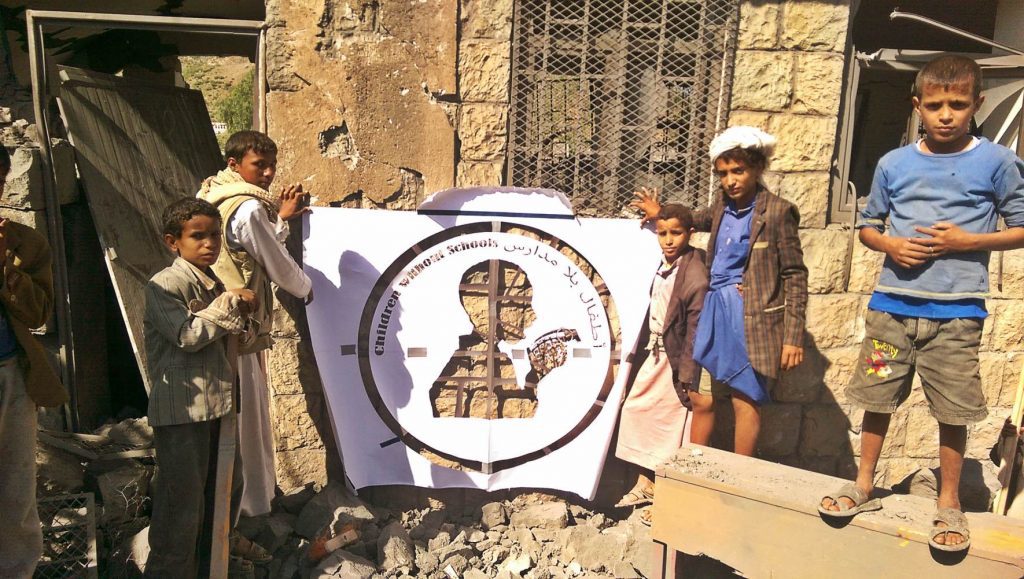
Credit: Ruins campaign. Bani Waleed, September 2016
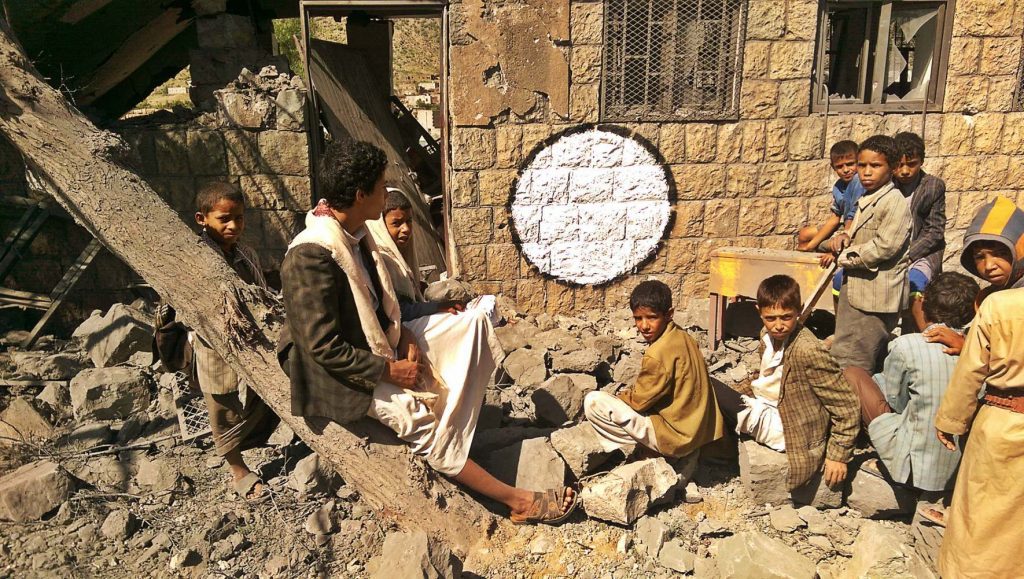
Credit: Ruins campaign. Bani Waleed, September 2016
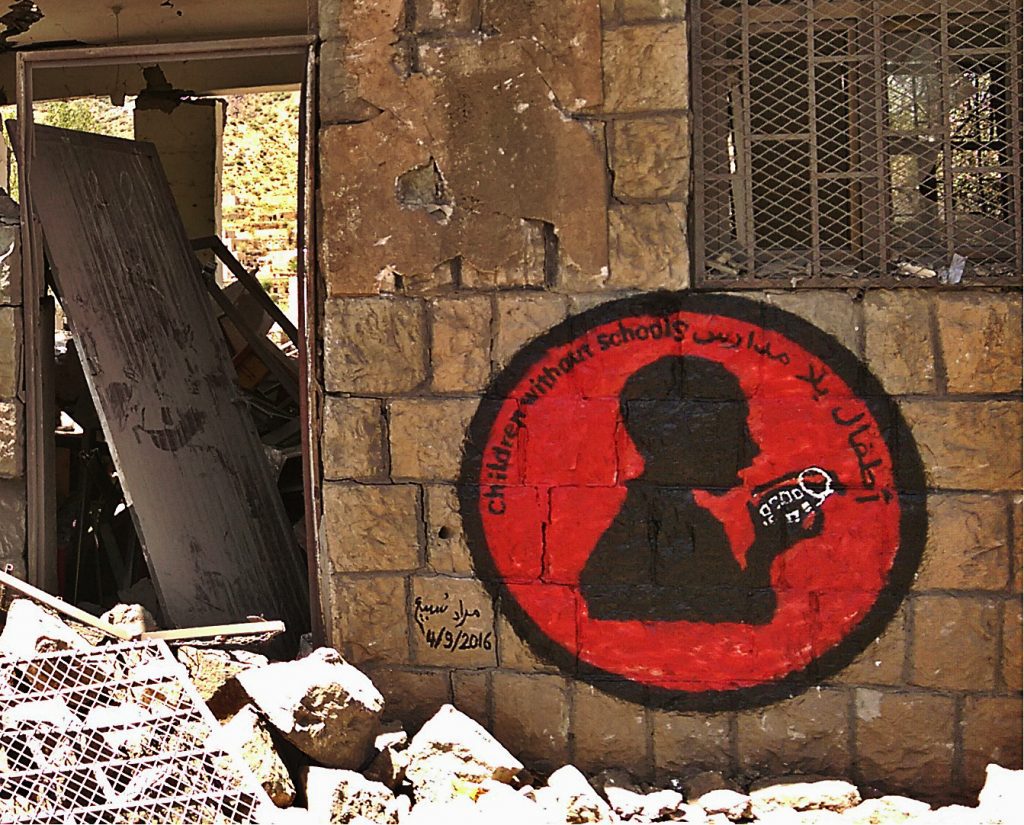
Credit: Ruins campaign. Bani Waleed, September 2016
The mural completed on 4 September depicts a child holding a hand grenade in place of a book, with the words “Children without schools” painted in English and Arabic.
When painting with fellow artists from the Ruins campaign – set up in May 2015 in collaboration with fellow artist Thi Yazen to paint on the walls of buildings damaged by the war – on 25 August, the group were arrested and interrogated by a local militia.
“They asked us to sign a letter with our fingerprints promising that we would not return again without permission,” Subay explains. “I actually did have permission from a local tribal leader but they wouldn’t listen.”
The artists were told if they returned they would be punished.
“My friends were very afraid and some of them said even with permission they would not return,” Subay said. “It was a strange situation for them.”
Subway himself isn’t put off and is already looking forward the next Ruins campaign, wherever that may be.
(2/2)whoever defaced the murals, wrote the word “steadfast” on both of them. #Yemen #Ruins_Campaign pic.twitter.com/3mhCfEulJT
— murad subay (@muradsubay) June 15, 2016
The last time he spoke with Index, Ruins had just completed a series of murals in front of the Central Bank of Yemen to represent the country’s economic collapse. Soon after the murals were finished, Houthi rebels defaced two out of the three works of art, writing “Samidoon” (صامدون), meaning “steadfast”, which is one of their slogans.
Assessing the situation in Yemen and the many different sides of the conflict, Subay said: “It is very difficult. Every night we hear airstrikes here and there, but we go on with our lives.”
“But any day when I can paint is a good one.”
Nominations are now open for 2017 Index on Censorship Freedom of Expression Awards and will remain open until 11 October. You can make yours here.
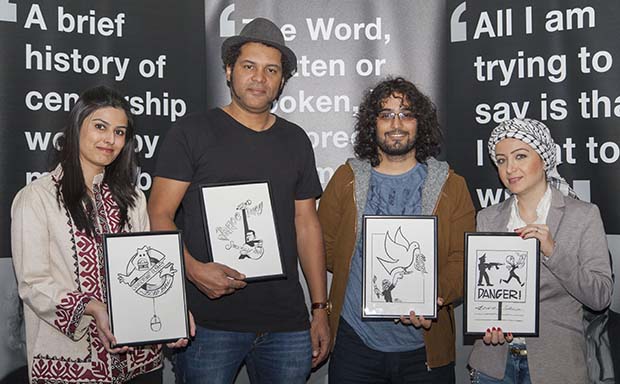
Winners of the 2016 Freedom of Expression Awards: from left, Farieha Aziz of Bolo Bhi (campaigning), Serge Bambara — aka “Smockey” (Music in Exile), Murad Subay (arts), Zaina Erhaim (journalism). GreatFire (digital activism), not pictured, is an anonymous collective. Photo: Sean Gallagher for Index on Censorship